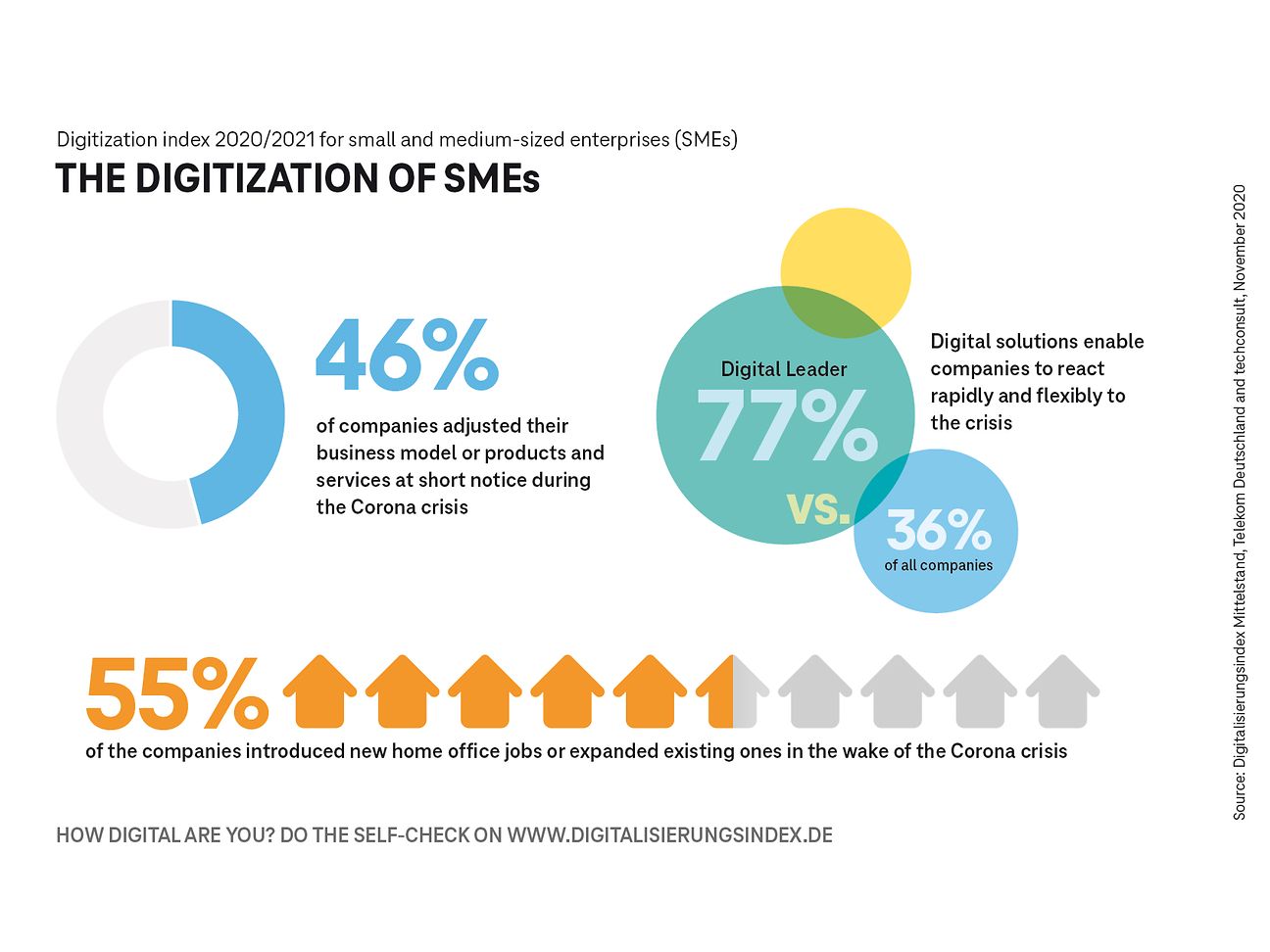

Digitization index for businesses: Corona accelerates digitization in medium-sized businesses
- More than 2,000 companies surveyed
- Figures prove: Mobile and flexible IT helps through the crisis
- Study shows where companies adjust investments
German medium-sized businesses are becoming more digital. This affects all areas of value creation as well as all industries and company sizes. Corona acts as a driver. Mobile and flexible IT helps companies to counter the consequences of the pandemic. This is the conclusion of the representative Telekom study "Digitization Index for Medium-sized Businesses 2020/2021" - the fifth in succession. In addition to the present study report, six industry reports will be published in the coming weeks. They focus on developments in the industry, logistics, retail, construction, hospitality and trade sectors.
"It is no surprise: Companies with a high degree of digitization get through crises better," says Hagen Rickmann, Managing Director Business Customers at Telekom Deutschland. "The results also show that almost half of the companies are expanding their digital offerings and want to push ahead with the digitization of their processes. This is a positive development.”
46 percent of the companies surveyed made short-term adjustments to their business models, products and services during the Corona crisis. More than half introduced new home office workstations or expanded their offerings. Almost three quarters offered their employees to work in the home office. These steps have accelerated digitization in German SMEs overall.
Productivity reaches new record level
The speed is particularly evident in productivity. The digital transformation has reached a new high with 56 index points and an increase of four points over the previous year. Examples are improved workflows and structures. Mobile and flexible working makes it easier to transfer workstations to the home office. There, teams are physically separated from each other. And yet work together efficiently.
Digital catalyst home office
To remain capable of acting during the lockdown, companies equipped their employees for the home office. Often under time and financial pressure. The main demand was therefore for tools for collaboration and more efficient processes. Companies made short-term investments in mobile devices and mobile business applications. This has driven digitization as a whole. The healthcare, service and retail sectors are also increasingly using digital solutions.
Customers also benefit
The relationship with customers takes no considerations of lockdowns. Many companies therefore use digital channels and social networks for contact. There they market their products and services. This is how companies communicate up-to-date offers - and provide advice via video. This seems to be largely successful: The index value for the area of customer relations has risen by three points to 58 points compared to the previous year. Many SMEs have also further developed their business models with digital products. Here, the index value also rose by three points to 51, while data protection and security remained consistently important with 68 index points.
Change in investment focus
The corona crisis forces a balancing act between saving and investing. Decreasing turnover and limited budgets lead to clear investment priorities. These include mobile devices, tools for communication and collaboration, and VPN solutions. Also in focus: the protection and security of data. Tools in the cloud, private WLAN and unsecured workspaces in the home office pose new risks.
Despite the crisis, 60 percent of companies are sticking to their IT budgets. In contrast, 18 percent of companies are initially postponing their investments. These companies are found primarily in industries that have been hit harder by the crisis. These include the hospitality industry as well as art and entertainment. Technologies such as AI, Blockchain, Augmented and Virtual Reality (AR/VR) are also affected, as are digital innovation culture and change management in general.
Top digitizers profit at most
The economic benefits are particularly evident among the digital frontrunners. This refers to the ten percent of companies with the highest level of digitization. 77 percent of them reacted quickly and flexibly to the crisis. This figure is even higher if the business model was already largely digital before the pandemic began. Of the remaining companies, only 36 percent describe a comparable effect.
Free self-check
For the study, analysts from techconsult interviewed more than 2,000 small and medium-sized companies. The complete study as well as the individual industry reports are available free of charge at: www.digitalisierungsindex.de. Companies can also check their digital status quo themselves. The check is also free, goes online and takes only a few minutes. And makes a comparison with other companies possible without effort. The address: http://www.benchmark.digitalisierungsindex.de.
About Deutsche Telekom: Deutsche Telekom at a glance


